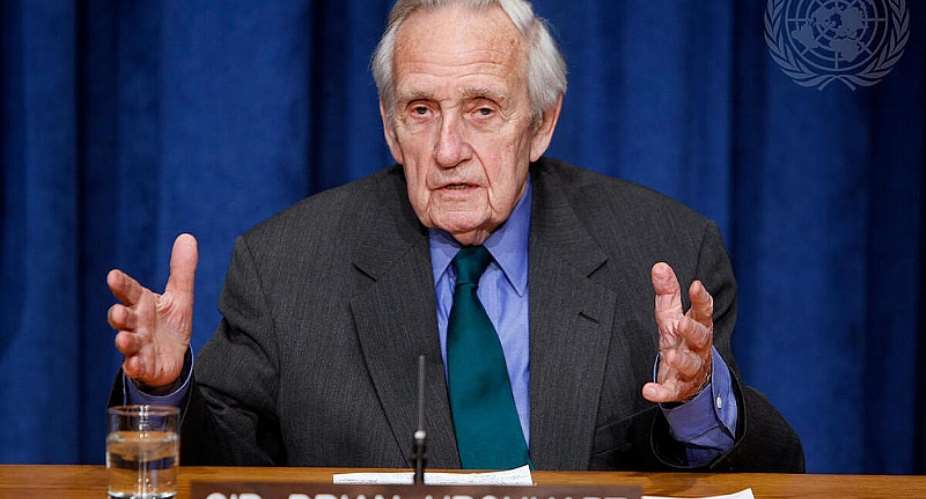Sir Brian Urquhart, who played a crucial role in the founding of the United Nations and establishing international peacekeeping operations, has died in Tyringham, Massachusetts. He was 101.
Born in 1919 in Bridport, England, he served in the British military intelligence during World War II before going to work for the UN in 1945.
An adviser to five Secretaries-General, Urquhart left an indelible mark on the international organisation, through his peacekeeping legacy, his numerous books on the UN, and his dedication to peaceful solutions, no matter what the conflict.
Urquhart believed in the special loyalty required of a global civil servant, insisting that such a responsibility went beyond serving an individual member state in an international capacity.
He was instrumental in setting up the United Nations, from its first meetings, to deciding on New York as its headquarters. But his foundation and contribution to UN peacekeeping – including having peacekeepers don 'blue helmets' to distinguish themselves from other soldiers – has left a lasting mark on the international body as a whole.
DRCongo peacekeeping
Urquhart headed peacekeeping in Cyprus, Lebanon, Namibia, and in the Democratic Republic of Congo in 1960, one of his most challenging assignments, and one he called “a kind of rehearsal for these huge operations the UN does today…with a country that's completely broken down within its own boundaries, and dealing with all sorts of armed factions”.
In 1961, after Urquhart was kidnapped and beaten by Congolese rebels working to secede the southern mining city of Katanga, the Indian Gurkha regiment serving as peacekeepers threatened then-President Moise Tshombe that if Urquhart was not released within four hours, they would blow up the presidential palace.
He was released.
Urquhart was at the diplomatic centre of many of the events that marked the 20th century.
Joseph-Désiré Mobutu, who later became president of DRC, rested in Urquhart's bedroom with a bottle of whiskey before the radio announced Mobutu's coup d'état in 1965, he recalls in a character sketch of the man.
Urquhart worked as an aide to Dag Hammarskjold, the second Secretary-General, and later worked as under-Secretary-General for Political Affairs in 1974, a position he held for 12 years. He also worked closely with American Ralph Bunche, who had previously held that position. Bunche, considered one of the stars of the UN, won the Nobel Peace Prize in 1950 for his work on Israeli relations in the late 1940s.
Urquhart wrote well-received biographies of both men.
The international diplomat had been at the helm of 13 peacekeeping missions, creating an essential function of the UN, before he retired in 1986.
He was knighted by Queen Elizabeth II in 1986.
Roots of UN peacekeeping in WWII
His penchant for peacekeeping had foundations in his duties during World War II, where he worked as chief intelligence officer of the British Airborne Corps. After injuring himself in a jump when his parachute didn't open, he became a desk officer.
Urquhart opposed British General Bernard Montgomery in 1944, who wanted a swift end to the war in Europe by carrying out an airborne assault to seize bridges over the Rhine. Some 17,000 allied troops lost their lives in the debacle.
Urquhart was later among the first allied troops to discover the Bergen-Belsen concentration camp, where the Nazis had murdered at least 50,000 people.
Urquhart is survived by his five children, a stepson, 14 grandchildren and 10 great-grandchildren.
In a statement, UN Secretary-General, Antonio Guterres, quoted from Urquhart's memoir, A Life of Peace and War: “Sir Brian noted that 'We were all optimists…who believed in the possibility of organising a peaceful and just world.'
“We are grateful for his brilliant and incomparable contributions as a stalwart servant of 'we the peoples',” Guterres added.





 Voter registration: Two Togolese Nationals arrested in Buem for attempting to re...
Voter registration: Two Togolese Nationals arrested in Buem for attempting to re...
 DR Congo thwarts Kinshasa 'coup attempt': army
DR Congo thwarts Kinshasa 'coup attempt': army
 Media has made good progress in Ghana — Frema Opare
Media has made good progress in Ghana — Frema Opare
 E/R: We will demonstrate against our parliamentary candidate for disappearing af...
E/R: We will demonstrate against our parliamentary candidate for disappearing af...
 Kotokuom elders issue ultimatum to Kwaku Boah to stop defaming Atwima Agogohene ...
Kotokuom elders issue ultimatum to Kwaku Boah to stop defaming Atwima Agogohene ...
 W/R: Tragic premix explosion injures 16 in Ngyirasia
W/R: Tragic premix explosion injures 16 in Ngyirasia
 Election 2024: NDC pledges to scrap betting tax, targets 80% youth support
Election 2024: NDC pledges to scrap betting tax, targets 80% youth support
 Mahama was a one-term president because he was incompetent and brought untold ha...
Mahama was a one-term president because he was incompetent and brought untold ha...
 Blame IMF programme for Cedi's decline —Prof Bokpin
Blame IMF programme for Cedi's decline —Prof Bokpin
 Court denies Kasoa soldier killer bail
Court denies Kasoa soldier killer bail
